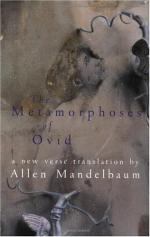|
This section contains 5,349 words (approx. 18 pages at 300 words per page) |

|
SOURCE: “Lavinia's Message: Shakespeare and Myth,” in Renaissance Papers, 1981, pp. 55-69.
In the following essay, Mowat detects the presence of classical myths from Ovid's Metamorphoses as structuring principles in Shakespeare's plays Titus Andronicus and The Merchant of Venice.
Act IV, Scene 1, of Titus Andronicus is surely one of the more remarkable scenes in Shakespeare. It opens with young Lucius running on-stage carrying an armload of books, pursued by his mutilated Aunt Lavinia, hands cut off, tongue cut out. In his panic, the boy throws down the books and calls for help. Lavinia rummages through the books with her stumps, heaves her arms in the air, and, as her father and uncle notice with astonishment, pulls “Ovid's Metamorphosis” from the pile. Perhaps, they suggest, the book has sentimental associations for her. Then they see her try to turn the pages; they watch as she “quotes the leaves”; they read...
|
This section contains 5,349 words (approx. 18 pages at 300 words per page) |

|


